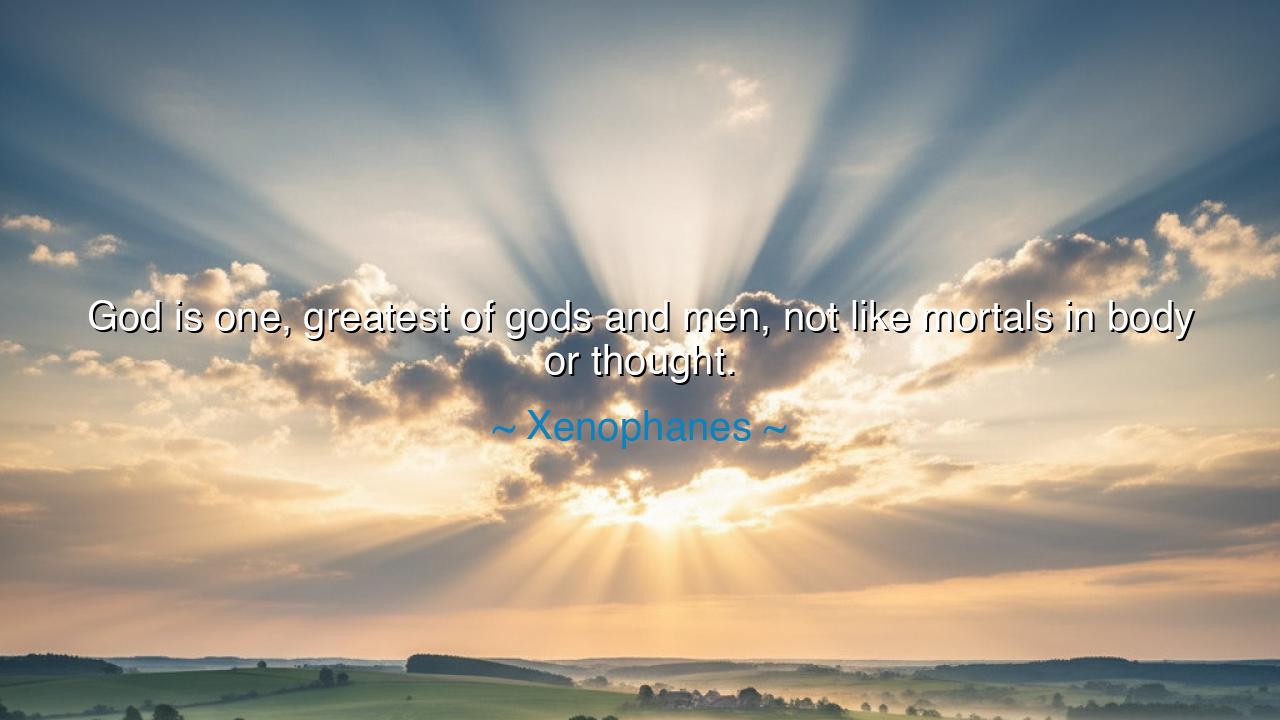
God is one, greatest of gods and men, not like mortals in body or






The words of Xenophanes of Colophon echo through the corridors of time like a sacred hymn of awakening: “God is one, greatest of gods and men, not like mortals in body or thought.” Spoken over two and a half millennia ago, in an age when men bowed before a multitude of gods carved from marble and fear, this statement was nothing short of revolutionary. It was the dawn of monotheistic thought in a polytheistic world — a declaration that the divine was not many, not fragmented, not fashioned in the image of man, but One, vast and beyond comprehension. With these words, Xenophanes challenged humanity to lift its eyes beyond the idols of its own making and seek the eternal, invisible truth that transcends form and limitation.
To understand the origin of this quote, we must return to the sixth century before Christ, when Greek civilization was rich in art, myth, and philosophy, yet bound by the human tendency to project its own likeness onto heaven. The Olympian gods were powerful, but they quarreled, envied, and lusted like mortals. Xenophanes, both poet and philosopher, saw the contradiction in this — how could the divine be subject to the frailties of man? He declared that true divinity cannot be like us, for the eternal cannot share the flaws of the temporal. To him, God was not flesh and bone, but thought and being itself — the unmoving unity that perceives and governs all things without the need of human form.
This vision was not merely intellectual; it was spiritual rebellion. Xenophanes dared to suggest that the divine was pure mind, infinite and just, not bound by the passions of men. He taught that the heavens, the earth, and all creation were reflections of a single, all-encompassing power. This thought, radical for his time, sowed the seeds that centuries later would flower in the philosophies of Parmenides, Plato, and even in the monotheism of the Abrahamic faiths. In his bold simplicity, Xenophanes redefined the sacred: God as unity, not multiplicity; spirit, not shape; wisdom, not whim.
Consider how this truth reveals itself through the ages. When Galileo Galilei, centuries later, faced persecution for declaring that the earth revolved around the sun, he stood upon a similar principle — that truth is not bound by tradition or human pride. He gazed into the heavens and saw not chaos, but order, not many wills but one intelligence behind the stars. In both men — Xenophanes and Galileo — the same fire burned: the conviction that reality itself bears the mark of divine unity, and that to seek truth is to seek God. Both were ridiculed in their time, for humanity always resists the truth that demands humility — that God is greater than our images of Him.
The emotional power of Xenophanes’ words lies in their humility and courage. He does not describe a god fashioned after kings or heroes, but a mystery beyond measure — a Being that moves all things by the power of thought alone. This God does not shout from mountains or demand blood from altars; He is the silent order of existence, the pulse within the stars, the reason within the soul. To know Him is not to see with the eyes, but to awaken the inner vision — that sacred awareness that senses unity beneath the world’s illusion of division.
And yet, his message carries a warning. When men create gods in their own image, they also create excuses for their own cruelty and vanity. Nations rise claiming divine favor, rulers justify tyranny as holy right, and people forget that the divine cannot be owned, named, or limited. Xenophanes reminds us that God is not captured by temple walls, not confined to one tribe or tongue. The divine is One, and in that Oneness lies the equality of all beings — a truth that, if lived, would dissolve the boundaries of hatred and pride.
The lesson of this quote is timeless: seek the divine not in image, but in essence. Do not reduce God to the likeness of your fears or desires. Instead, contemplate the unity that binds all life — the rhythm that makes the sea rise, the stars turn, and the heart long for truth. Let humility be your worship, and understanding your prayer. When you look upon another, remember that they too are animated by the same eternal breath.
Thus, the words of Xenophanes stand as both revelation and challenge: “God is one, greatest of gods and men, not like mortals in body or thought.” They call us to rise from the dust of superstition and behold the divine not as reflection, but as reality — not as many, but as One. To live by this truth is to live with reverence for all creation, knowing that behind every face, every motion, and every mystery, there is but one eternal Thought — the mind of God, the heartbeat of existence itself.






AAdministratorAdministrator
Welcome, honored guests. Please leave a comment, we will respond soon